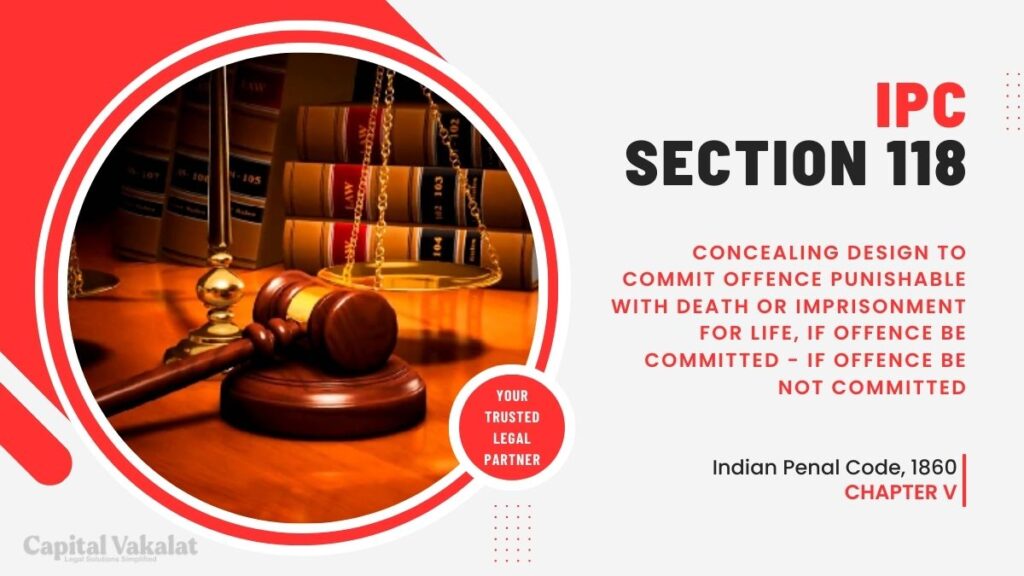In the realm of Indian Penal Code (IPC), Section 118 holds a significant position as it addresses the issue of concealing designs to commit offenses that are punishable with death or imprisonment for life. This legal provision plays a pivotal role in ensuring the prevention and prosecution of those who intend to commit heinous crimes.

In this article, we will delve into the details of Section 118 IPC, its implications, and its importance in the legal framework of India.
Understanding Section 118 IPC
Section 118 of the IPC deals with the act of concealing a design to commit an offense that is punishable with death or imprisonment for life. It is crucial to comprehend that this section not only focuses on the act itself but also on the intent behind it. It aims to penalize those who are involved in the early stages of planning a severe offense.
The Offence of Concealing Design
The offense covered under Section 118 IPC is the concealment of a design to commit an offense. This concealment may take various forms, including written plans, verbal discussions, or any other means that hide the criminal intent. The primary objective is to prevent the execution of a heinous crime by identifying and penalizing those involved in planning it.
Punishments under Section 118 IPC
Offenses under Section 118 IPC are grave, and the penalties are commensurately severe. If an individual is found guilty of concealing the design to commit an offense punishable with death or imprisonment for life, they can face punishment as prescribed by the law. It is essential to note that the gravity of the concealed offense determines the severity of the punishment.
Key Elements of the Offence
To establish a case under Section 118 IPC, the prosecution needs to prove certain key elements. These elements include the existence of a design to commit a serious offense, the accused’s knowledge of this design, and their active participation in concealing it. The burden of proof lies with the prosecution to demonstrate these elements beyond a reasonable doubt.
Proving Concealing Design
Proving the offense of concealing design can be a complex task. It requires a meticulous examination of evidence, which may include written records, witness statements, and any other relevant information. Courts often rely on circumstantial evidence to establish the accused’s guilt.
Instances and Cases
Over the years, Section 118 IPC has been invoked in various cases, including terrorism-related offenses and planned murders. Notable cases such as those involving terrorist conspiracies have highlighted the importance of this section in preventing major crimes.
Defenses Against Section 118 IPC
Defending against charges under Section 118 IPC may involve challenging the evidence presented by the prosecution or asserting that the accused had no knowledge of the concealed design. It is crucial for the accused to seek legal counsel to explore viable defense strategies.
Challenges in Implementing Section 118 IPC
The implementation of Section 118 IPC is not without challenges. The law must strike a delicate balance between preventing crimes and protecting individual rights. Ensuring that this section is not misused to target innocent individuals is a significant challenge faced by the legal system.
Significance of Section 118 IPC
Section 118 IPC serves as a deterrent to those who would plan and execute heinous crimes. By penalizing the concealment of such designs, it discourages individuals from participating in criminal activities and contributes to maintaining law and order in society.
Conclusion
In conclusion, Section 118 IPC addresses the concealment of designs to commit offenses punishable with death or imprisonment for life. It plays a vital role in the Indian legal system by deterring potential offenders and aiding in the prosecution of those involved in planning serious crimes. However, its implementation comes with challenges that require careful consideration. This section serves as a critical tool in maintaining public safety and upholding the rule of law.
FAQs
What are the punishments for concealing design under this section?
Punishments under Section 118 IPC are determined by the gravity of the concealed offense and can include death or imprisonment for life.
How is the offense of concealing design proven in court?
The prosecution must establish key elements, including the existence of a design, the accused’s knowledge, and their active participation in concealing it.
Can one defend themselves against Section 118 IPC charges?
Yes, individuals accused under Section 118 IPC can seek legal counsel and mount a defense based on the evidence and circumstances of the case.
What are the challenges associated with implementing Section 118 IPC?
The challenges include striking a balance between preventing crimes and protecting individual rights, ensuring the section is not misused, and preserving the principles of justice and fairness.